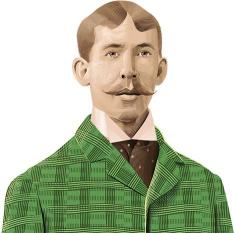In the spring of 1897, George “Horse” Edwards 1889 learned that his health, which had grown progressively worse from tuberculosis over the past three years, had taken a drastic downturn. Doctors told the 30-year-old that his remaining time on Earth could be measured in days. He already knew where he wanted to spend those days.
“I shall probably die next spring, but I desire to pass away in old East College, where I roomed in Princeton,” he’d told friends the previous year. “I want to see one more Yale game and attend another Ivy dinner, and then I shall be happy.”
On June 11, a humid afternoon, Edwards returned to campus for Reunions. “He was very weak from his illness,” recalled an alum who attended the event. “He could barely raise his hand to wave to the host of old friends who greeted him as he rode from the station to East College, where his old room had been arranged as in his college days for his return.”
Many Reunions traditions were new in those years. The first P-rade took place just the year before. In 1897, the P-rade marchers, for the first time, wound their way to the baseball field to watch the Tigers play against Yale. Edwards couldn’t walk that far, so his classmates pushed him along in a wheeled chair. The Tigers trounced the Bulldogs, and he was palpitant with joy, classmates said.
Edwards, a Delaware native, got his nickname in college from his fondness for pranks and tricks, or horseplay. “Edwards was the popular man of his day,” James Alexander 1898 wrote in a book about Princeton, published just a year after Edwards’ passing. “No college crowd was complete if he were not present. He had a species of humor altogether original, and those who knew him — young and old — will never forget his mock seriousness when called on to make a speech at some reunion, or how he would point his finger at some imaginary victims of his oratory, and with frowning brow and piercing eye utter the words: ‘And, sirs!’”
He’d heard the clack of billiard balls in his old eating club and the roar of thousands at the University ball field. He’d watched the daylight sink over Nassau Hall, relived old pranks with friends from his happiest years, and looked at the night sky through treetops heavy with the song of summer insects.
After graduation, Edwards studied medicine at the University of Pennsylvania, becoming a doctor at Philadelphia’s Presbyterian Hospital and then the Johns Hopkins Hospital. Every year, he got together with fellow members of his eating club, Ivy, to raise a glass at an alumni dinner. At the 1897 Reunions, he gave one last Ivy toast. “When the after-dinner speaking began, ‘Horse’ came to the table, and laughed and cried as his old friends toasted him to the echo and sang to him in the old familiar strain: ‘Here’s to you, Horse Edwards! Here’s to you, my jovial friend!’”
At 2 p.m. on Monday, Edwards passed away in his old dorm room, surrounded by friends and former professors. “Although his death was not announced until 11 o’clock on Monday night, on the following morning at 8 o’clock over 500 persons were present at the services held in the college chapel,” a newspaper article of the time said.
Black-and-orange bunting hung all around. That weekend, winding through crowds of faces that glowed with expressions decades younger than their wearers, Edwards had looked at cheerfully derelict little dorm rooms, well-worn chairs in lecture halls, the medieval gold of morning light on limestone. He’d heard the clack of billiard balls in his old eating club and the roar of thousands at the University ball field. He’d watched the daylight sink over Nassau Hall, relived old pranks with friends from his happiest years, and looked at the night sky through treetops heavy with the song of summer insects.
When he passed into Paradise, did he even notice the difference?

